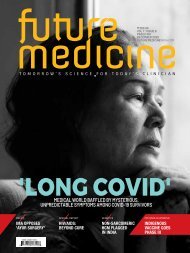Create successful ePaper yourself
Turn your PDF publications into a flip-book with our unique Google optimized e-Paper software.
Bhattad proceeded to plan and collaborate with Drs Stalin<br />
Ramprakash and CP Raghuram, bone marrow transplant<br />
experts at Aster CMI Hospital, to perform this transplant.<br />
Ciara was admitted to the hospital about 2 weeks prior<br />
to the transplantation so that all tests could be carried out<br />
and she could be closely monitored. She was again kept in<br />
the hospital for 2-3 weeks after the transplant to ensure<br />
that there were no adverse effects and she did not get any<br />
infections immediately after the transplantation.<br />
Many factors contribute to the success of transplantation.<br />
HLA donor matching and the underlying condition of the<br />
patient play major roles in success, and the patient must<br />
be closely monitored post the transfer of the bone marrow.<br />
These factors, along with the age and weight of the patient<br />
as well as kidney involvement, contribute to a decision on the<br />
medical treatment that follows transplantation. Due to Ciara’s<br />
kidney and lung involvement, medications were carefully<br />
planned. Complications were also anticipated as preexisting<br />
organ damage increases the risk of complications during and<br />
after the transplant, making the technique complex and one<br />
requiring meticulous planning.<br />
Ciara underwent successful transplantation and is doing<br />
very well so far. She will need to be closely monitored for<br />
the next 3 months and be on immunosuppressants for the<br />
next 6 months. Dr Bhattad calls it the ‘100 day’ period posttransplantation<br />
when there is a high risk of infection and<br />
chances of transplant rejection. However,<br />
after the ‘100 day’ period, the new bone<br />
marrow starts to function completely, and the<br />
immunosuppressant doses can be decreased.<br />
Aster CMI in Bangalore has a dedicated<br />
Immunology and Bone Marrow Transplant<br />
Unit (BMT) which encounters many children<br />
with immune deficiencies, as in Ciara’s case.<br />
Dr Bhattad reiterates that “Primary immune<br />
deficiencies are actually quite common, but<br />
often undiagnosed. It should particularly be<br />
considered in case of repeated infections<br />
and multiple hospitalizations, ideally before<br />
irreversible organ damage occurs. Awareness<br />
of such deficiencies is particularly important,<br />
especially now that the required diagnostics<br />
and therapeutics are available. Eyes see only<br />
what the mind knows.”<br />
Only when doctors start looking for these<br />
conditions in their patients will they be<br />
able to make an early diagnosis. Increasing<br />
awareness of these diseases is the need of<br />
the hour.<br />
DR SHIVANEE SHAH<br />
<strong>April</strong> <strong>2019</strong> / FUTURE MEDICINE / 51


















